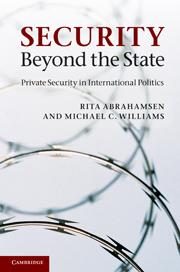5 - Safer cities or cities of walls?
The politics of urban global security assemblages
Published online by Cambridge University Press: 05 June 2012
Summary
While the role of private security in resource extraction and conflict situations has attracted considerable attention, its place in the provision of everyday security in the developing world has been the subject of much less debate. Yet it is here, in the routines of daily life, that private security is most pervasive and has some of its most extensive impacts and implications. This is particularly the case in the world’s fast expanding cities. For the first time in history, more than half the world’s population live in urban areas, and in Africa and Asia the urban population is forecast to double between 2000 and 2030, by which time towns and cities in the developing world will make up 81 per cent of urban humanity. In the past few years, urban security has become an issue of increasing prominence on the agendas of national governments, development agencies and international organizations, whether in the guise of human security or as part of more contentious claims about the potential connections between ‘feral cities’ and international terrorist networks. In the ever-shifting politics of security, the urban looks set to become one of the next big things.
For urban residents in most of Africa, private security in one form or another is a fact of life. The inadequate resources of public police forces, coupled with their all-too-frequent penchant for coercion and corruption – or what René Lemarchand has described as the ‘moral discredit incurred by the state, both as a concept and institution’ – remains an acute political fact, as it does across much of the developing world. It is also a key reason why corporations, organizations, neighbourhoods and individuals are reluctant to place their security wholly in the hands of the public security apparatus, thus making the uniformed guards of PSCs an ever more familiar feature of the urban landscape. But, like the police, PSCs are the potential providers of both security and insecurity. Stories of private security guards turned villains, robbers and even murderers abound in many contemporary cities, coexisting with tales of their heroism and indispensability. Even if the evidence on both counts is oftentimes, but not always, anecdotal, there is little doubt that a disordered and unregulated private security sector can add significantly to the violence and turmoil of urban space.
- Type
- Chapter
- Information
- Security Beyond the StatePrivate Security in International Politics, pp. 172 - 216Publisher: Cambridge University PressPrint publication year: 2010

